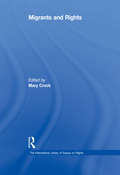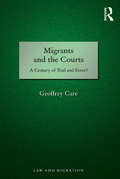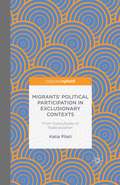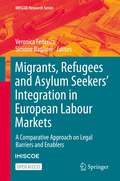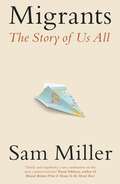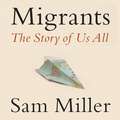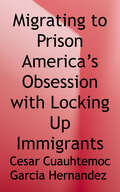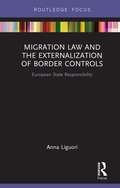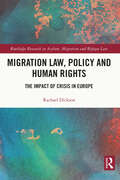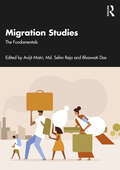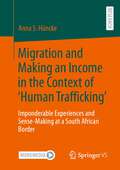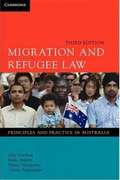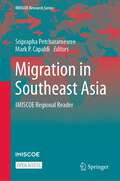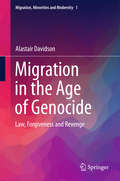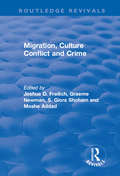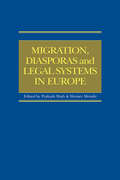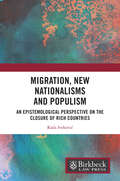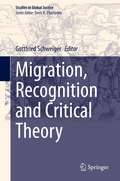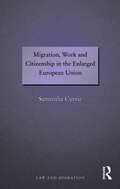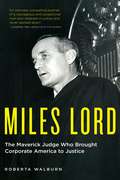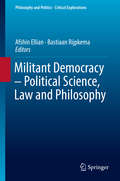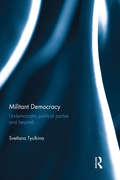- Table View
- List View
Migrants and Rights (The International Library of Essays on Rights)
by Mary CrockThe concept of the migrant as rights bearer at law is surprisingly recent and under-developed. Migrants have traditionally been seen as outsiders, persons who are in society but not yet of society. Migrants are at best invitees, ’guests’ for whom presence in a country is a privilege. This is the first of two volumes which bring together writings which trace the evolution in thinking about migrants as legal subjects and rights holders. The articles cover: issues around state sovereignty and migrants as subjects of international law; the articulation of rights; different categories of migrants; issues around health and disability. The volume also features an extended article on the proposal for an International Migrants’ Bill of Rights (IMBR) put forward by an international consortium of academics and students. A related volume Refugees and Rights is also published as part of the series.
Migrants and the Courts: A Century of Trial and Error? (Law and Migration)
by Geoffrey CareWritten in a lively and engaging style from the perspective of a leading immigration judge, this book examines how states resolve disputes with migrants. The chapters reflect on changes in the laws and rules of migration on an international and regional basis and the impact on the parties, administration, public and judiciary. The book is a critical assessment of how the migration tribunal system has evolved over the last century, the lessons which have been learnt and those which have not. It includes additional comparative contributions by authors on international jurisdictions and is a valuable overview of the evolution and future of the immigration tribunal system which will be of interest to those involved in human rights, migration, transnational and international law.
Migrants' Participation in Exclusionary Contexts: From Subcultures to Radicalization
by K. PilatiThis insightful book analyzes the political engagement and marginalization of three of Milan's migrant groups, Filipinos, Egyptians and Ecuadorians. Bringing together data relating to the civic and political engagement of individual migrants, and of migrant organizational networks, the result is an examination of the consequences of the political exclusion of migrants, exploring the different ways in which they cope with this predicament. Such exclusion, the author argues, has three major impacts. It can transform migrant groups into political subcultures and engender externally-driven participation, but it can also lead to radicalization.
Migrants, Refugees and Asylum Seekers’ Integration in European Labour Markets: A Comparative Approach on Legal Barriers and Enablers (IMISCOE Research Series)
by Simone Baglioni Veronica FedericoThis open access book discusses how, and to what extent, the legal and institutional regimes and the socio-cultural environments of a range of European countries (the Czech Republic, Denmark, Finland, Greece, Italy, Switzerland and the UK), in the framework of EU laws and policies, have a beneficial or negative impact on the effective capacity of these countries to integrate migrants, refugees and asylum seekers into their labour markets. The analysis builds on the understanding of socio-cultural, institutional and legal factors as “barriers” or “enablers”; elements that may facilitate or obstruct the integration processes. The book examines the two dimensions of integration being access to the labour market (which, translated into a rights language means the right to work) with its corollaries (recognition of qualifications, vocational training, etc.), and non-discriminatory working conditions (which, translated into a rights language means right to both formal and substantial equality) and its corollaries of benefits and duties deriving from joining the labour market. It thereby offers a novel approach to labour market integration and migration/asylum issues given its focus on legal aspects, which includes most recent policy changes and legal decisions (including litigation cases). The robust, evidence-based and comparative research illustrated in the book provides academics and students, but also practitioners and policy makers, with up to date knowledge that will likely impact positively on policy changes needed to better address integration conundrums.
Migrants: The Story of Us All
by Sam MillerMigrants cuts through the toxic debates to tell the rich and collective stories of humankind's urge to move.'Fascinating... Miller's perspective may be just what we need' Daily Telegraph'Timely and empathetic: a rare combination on this most controversial issue' Remi Adekoya, author of Biracial Britain'Tremendous: blends the personal and the panoramic to great effect' Robert Winder, author of Bloody ForeignersHumans are, in fundamental ways, a migratory species, more so than any other land mammal. For most of our existence , we were all nomads, and some of us still are. Houses and permanent settlements are a relatively late development - dating back little more than twelve thousand years. Borders and passports are much more recent. From the Neanderthals, Alexander the Great, Christopher Columbus and Pocahontas to the African slave trade, Fu Manchu, and Barack Obama, Migrants shows us that it is only by understanding how migration and migrants have been viewed in the past, that we can re-set the terms of the modern-day debate about migration.Migrants presents us with an alternative history of the world, in which migration is restored to the heart of the human story. And in which humans migrate for a wide range of reasons: not just because of civil war, or poverty or climate change but also out of curiosity and a sense of adventure. On arrival, migrants are expected both to assimilate and encouraged to remain distinctive; to defend their heritage and adopt a new one. They are sub-human and super-human; romanticised and castigated, admired and abhorred. Migrants tells us that this is not a new narrative; this is the history of us all, part of everybody's backstory - for those who consider themselves migrants and those who do not.
Migrants: The Story of Us All
by Sam MillerMigrants cuts through the toxic debates to tell the rich and collective stories of humankind's urge to move.'Fascinating... Miller's perspective may be just what we need' Daily Telegraph'Timely and empathetic: a rare combination on this most controversial issue' Remi Adekoya, author of Biracial Britain'Tremendous: blends the personal and the panoramic to great effect' Robert Winder, author of Bloody ForeignersHumans are, in fundamental ways, a migratory species, more so than any other land mammal. For most of our existence , we were all nomads, and some of us still are. Houses and permanent settlements are a relatively late development - dating back little more than twelve thousand years. Borders and passports are much more recent. From the Neanderthals, Alexander the Great, Christopher Columbus and Pocahontas to the African slave trade, Fu Manchu, and Barack Obama, Migrants shows us that it is only by understanding how migration and migrants have been viewed in the past, that we can re-set the terms of the modern-day debate about migration.Migrants presents us with an alternative history of the world, in which migration is restored to the heart of the human story. And in which humans migrate for a wide range of reasons: not just because of civil war, or poverty or climate change but also out of curiosity and a sense of adventure. On arrival, migrants are expected both to assimilate and encouraged to remain distinctive; to defend their heritage and adopt a new one. They are sub-human and super-human; romanticised and castigated, admired and abhorred. Migrants tells us that this is not a new narrative; this is the history of us all, part of everybody's backstory - for those who consider themselves migrants and those who do not.
Migrants: The Story of Us All
by Sam MillerMigrants cuts through the toxic debates to tell the rich and collective stories of humankind's urge to move.'Fascinating... Miller's perspective may be just what we need' Daily Telegraph'Enjoyable, provocative and timely' Spectator'Timely and empathetic: a rare combination on this most controversial issue' Remi Adekoya, author of Biracial Britain'Tremendous: blends the personal and the panoramic to great effect' Robert Winder, author of Bloody ForeignersHumans are, in fundamental ways, a migratory species, more so than any other land mammal. For most of our existence , we were all nomads, and some of us still are. Houses and permanent settlements are a relatively late development - dating back little more than twelve thousand years. Borders and passports are much more recent. From the Neanderthals, Alexander the Great, Christopher Columbus and Pocahontas to the African slave trade, Fu Manchu, and Barack Obama, Migrants shows us that it is only by understanding how migration and migrants have been viewed in the past, that we can re-set the terms of the modern-day debate about migration.Migrants presents us with an alternative history of the world, in which migration is restored to the heart of the human story. And in which humans migrate for a wide range of reasons: not just because of civil war, or poverty or climate change but also out of curiosity and a sense of adventure. On arrival, migrants are expected both to assimilate and encouraged to remain distinctive; to defend their heritage and adopt a new one. They are sub-human and super-human; romanticised and castigated, admired and abhorred. Migrants tells us that this is not a new narrative; this is the history of us all, part of everybody's backstory - for those who consider themselves migrants and those who do not.
Migrating to Prison: America's Obsession with Locking up Immigrants
by Cesar Cuauhtemoc Garcia HernandezFor most of America's history, we simply did not lock people up for migrating here. Yet over the last thirty years, the federal and state governments have increasingly tapped their powers to incarcerate people accused of violating immigration laws. As a result, almost 400,000 people annually now spend some time locked up pending the result of a civil or criminal immigration proceeding. In Migrating to Prison, leading scholar Cesar Cuauhtemoc Garcia Hernandez takes a hard look at the immigration prison system's origins, how it currently operates, and why.
Migration Law and the Externalization of Border Controls: European State Responsibility (Routledge Research in EU Law)
by Anna LiguoriOver the last few decades, both the European Union and European States have been implementing various strategies to externalize border controls with the declared intent of saving human lives and countering smuggling but with the actual end result of shifting borders, circumventing international obligations and ultimately preventing access to Europe. What has been principally deplored is the fact that externalizing border controls risks creating ‘legal black holes’. Furthermore, what is particularly worrying in the current European debate is the intensification of this practice by multiple arrangements with unsafe third countries, exposing migrants and asylum seekers to serious human rights violations. This book explores whether European States can succeed in shifting their responsibility onto Third States in cases of human rights violations. Focusing, in particular, on the 2017 Italy-Libya Memorandum of Understanding, the book investigates the possible basis for triggering the responsibility of outsourcing States. The second part of the book examines how the Italy-Libya MoU is only a small part of a broader scenario, exploring EU policies of externalization. A brief overview of the recent decisions of the EU Court vis-à-vis two aspects of externalization (the EU-Turkey statement and the issue of humanitarian visas) will pave the way for the conclusions since, in the author’s view, the current attitude of the Luxembourg Court confirms the importance of focusing on the responsibility of European States and the urgent need to investigate the possibility of bringing a claim against the outsourcing States before the Court of Strasbourg. Offering a new perspective on an extremely topical subject, this book will appeal to students, scholars and practitioners with an interest in European Law, International Law, Migration and Human Rights.
Migration Law, Policy and Human Rights: The Impact of Crisis in Europe (Routledge Research in Asylum, Migration and Refugee Law)
by Rachael DicksonMigration is one of the greatest societal challenges of our time. It has many facets, from mass movements to escape war, climate, or human rights abuses to the search for economic opportunity and prosperity. Illicit industries facilitate border crossings at the expense of safety, and governments face problems of processing and integrating new arrivals. These challenges have had a profound impact in Europe, calling into question central values of solidarity and human rights. This book analyses the law and policy of migration in the European Union (EU) and its relationship to understandings of the EU as an international human rights actor. It examines the role crisis plays in determining the priorities of migration policy and the impact political exigencies have on the rights of migrants. This book problematises the EU Area of Freedom, Security, and Justice as a ‘home.’ Taking a governmentality approach to critique discourse, the idea of a holistic approach is deconstructed to explore notions of wellness, resilience, responsibilisation and externalisaton. The EU’s pursuit of a holistic approach to managing migration in crisis indicates problems with EU solidarity, and the tactics employed to bring the crisis under control reveal security concerns that provoke questions about the EU as an international human rights actor. Both this framework for analysis and the empirical findings make a significant contribution to how the migration crisis can be theorised using adaptable conceptual tools. Under this form of governance, migration becomes a phenomenon to be treated so that its symptoms are ameliorated. This book will be of interest to students and scholars of the EU, migration, and human rights as well as policymakers, commentators, and activists in these areas.
Migration Studies: The Fundamentals
by Avijit Mistri Bhaswati Das Md. Selim RejaThis book is an essential toolkit for students and early researchers of population studies and demography, geography, economics, development studies political science, sociology, anthropology, and gender studies.The volume:- Presents in-depth coverage of basic concepts;- Includes empirical data, case studies, and references for further reading;- Covers critical aspects of migration studies ranging from the theoretical to contemporary issues and policies.The book will be of interest to scholars, students, researchers, or anyone interested in migration and diasporic studies, development studies, the politics of migration, immigration policy, social anthropology, economics, and sociology.
Migration and Making an Income in the Context of ‘Human Trafficking’: Imponderable Experiences and Sense-Making at a South African Border
by Anna S. HünckeThe book focuses on volatile processes at the South African-Zimbabwean border that arise from practices of migration and income generating activities. The processes are influenced by neoliberal developments and controversial discourses on migration, commercial sexual services, and human trafficking. In this unstable environment, different actors continuously negotiate, trying to achieve stable positions. By addressing issues related to migration and income generating activities, they maneuver between legal rules and their own moral values and interests. In their attempt to classify incidents in the border context that are unclear to them, actors’ explanations are partly based on the concept of transnational human trafficking. Thereby, they transfer the impenetrability discursively associated with this concept to what they see as obscure cross-border migration, disconcerting sexual services, and other alienating economic activities. Alternatively, actors understand undocumented cross-border migration, commercial sexual services, and other illegalised income-generating activities as common everyday practices at the border and also assume that human trafficking does not play an important role there.
Migration and Refugee Law: Principles and Practice in Australia
by Mirko Bagaric Penny Dimopoulos John Vrachnas Athula PathinayakeMigration and Refugee Law: Principles and Practice in Australia is a comprehensive overview of the legal principles governing the entry of people into Australia. This fully revised third edition provides an accessible analysis of the theory and practice of this complex and controversial area of the law. It considers the social and political context of migration and refugee law in devising innovative policies aimed at creating an equitable and rational immigration system. Migration and Refugee Law: Principles and Practice in Australia combines an astute consideration of theory with the creation of practical policy solutions, and is therefore an essential resource for migration lawyers and agents, government employees, students, judicial officers and policymakers.
Migration in Southeast Asia: IMISCOE Regional Reader (IMISCOE Research Series)
by Sriprapha Petcharamesree Mark P. CapaldiThis open access IMISCOE Regional Reader explores the issues faced by migrant groups in Southeast Asia and the challenges of getting of their human rights recognized. It analyses the different responses, or lack thereof, of the Association of Southeast Asian Nations (ASEAN) to these highly complex situations which are shaped by contemporary debates around borders and concepts of states, migrants’ rights as well as access to citizenship and how these concepts and paradigms are intertwined with issues such as agency and resilience of migrants. Crucial attention is given to the region’s lesser known populations and issues such as the Vietnamese in Thailand, people of Indonesian descent (PIDs) in Southern Philippines, independent child migrants across the region, and the vulnerabilities of migrant workers facing the COVID-19 pandemic. With its unique regional focus, this book provides a valuable resource to those studying human rights and migration issues, policy makers and researchers and students.
Migration in the Age of Genocide
by Alastair DavidsonThis book presents a novel proposal for establishing justice and social harmony in the aftermath of genocide. It argues that justice should be determined by the victims of genocide rather than a detached legal system, since such a form of justice is more consistent with a socially grounded ethics, with a democracy that privileges citizen decision-making, and with human rights. The book covers the Holocaust; genocides in Argentina, South Africa, Rwanda, Latin America, and Australia, as well as crimes against humanity in Italy and France. From show trials to state- enforced forgiveness, the book examines various methods that have been used since 1945 to punish the individuals and groups responsible for genocide and how they have ultimately failed to deliver true justice to the victims. The only way to end this failure, the book points out, is to return justice to the victims. This simple proposition; however, challenges the Enlightenment tradition of Western law which was built on the refusal to allow victims to determine the measure of justice. That would amount, according to Bacon, Hegel, and Kant to a revenge system and bring social chaos. But, as this book points out, forgiveness is only something victims can give, no-one can demand it. In order to establish a lasting peace, it is necessary to re-examine the philosophical and theoretical refusal to return justice to the victims. The engaging argument put forth in this book can help deliver true justice and re-establish international social harmony in the aftermath of genocide. Genocide is ubiquitous in the modern, global world. It's understanding is highly relevant for the understanding of specific and perpetuating challenges in migration. Genocide forces the migration of millions to avoid crimes against humanity. When they flee war zones they bring their fears, hates, and misery with them. So migration research must engage fully with the experience of genocide, its human conseque nces and the ethical dilemmas it poses to all societies. Not to do so, will make it more difficult to understand and live with newcomers and to achieve some sort of harmony in host countries, as well as those which are centers of genocide.
Migration in the Mediterranean
by Ippolito, Francesca and Trevisanut, Seline Francesca Ippolito Seline TrevisanutMediterranean states have developed various cooperation mechanisms in order to cope with the issues that arise from migration. This book critically analyses how institutional actors act and interact on the international scene in the control and management of migration in the Mediterranean. It highlights how, even though the involvement of 'universal' international organisations guarantees a certain balance in setting the goals of cooperation mechanisms and buttresses a certain coherence of the actions, the protection of migrants' fundamental rights is still an objective as opposed to a reality, and security imperatives and trends still prevail in the aftermath of the 2011 Arab Spring.
Migration, Culture Conflict and Crime (Routledge Revivals)
by Joshua D. Freilich Moshe AddadThis title was first published in 2002: The issue of immigration and crime in all of its many contexts and forms, is a problem which affects numerous countries throughout the world. In many countries, immigrants have been accused of disproportionate involvement in crime while, in others, immigrants are often claimed to be the victims of criminal offenders, as well as indifferent criminal justice systems. The subjects covered within this informative collection include the offending and victimization rates of immigrants and their dependants, institutional racism, human trafficking/smuggling and ethnic conflicts. In particular, the problems faced by female immigrants are addressed in detail. Whilst some papers look at the issues facing particular countries, such as Germany, the United Kingdom, Australia, Israel and Turkey, others adopt a more comparative approach. Migration, Culture Conflict and Crime is an essential and compelling read for all those with a strong interest in this important area. Not only does it significantly advance our scientific knowledge concerning the relationship between immigration, crime and justice, but it also sets forth a number of proposals which, if implemented, could address many of the problems found in these areas.
Migration, Diasporas and Legal Systems in Europe
by Prakash Shah and Werner F. MenskiAt a time when issues concerning migration and the formation of diasporic communities have come to be critical for all European legal systems, this volume reflects, discusses and analyzes the questions raised by diasporas who have established themselves in Europe over more than fifty years of immigration and the challenges faced by legal systems in the light of continued migration. Contributors from a broad range of backgrounds address prominent issues ranging from legal pluralism among minorities, pressures on EU accession states, irregular migration, state control of family reunification and formation in light of human rights laws, challenges for citizenship and nationality laws and the implementation of visa rules and juxtaposed control zones. Besides the EU as a supranational legal order, the book contains discussion of conditions in the United Kingdom, Ireland, France, Spain, Gibraltar, Morocco, Greece, Turkey and Lithuania.This volume accompanies The Challenge of Asylum to Legal Systems and is the second book to emerge from the W.G Hart Legal Workshop held in 2004 at London's Institute for Advanced Legal Studies.
Migration, New Nationalisms and Populism: An Epistemological Perspective on the Closure of Rich Countries
by Rada IvekovicThis book examines the antagonistic relationship between new European nationalisms as these often go hand-in-hand with populism, and the phenomenon of migration. Migration has become a significant issue both in Europe and the whole world. Although it has always existed, much of public opinion sees it now as a problem. The latter has been exaggerated through a crisis in hospitality exacerbated by the relatively recently constructed and misplaced feeling of a civilisational threat from islam. Migration is then countered by the escalation of new nationalisms, at least some of which are supported by populism. This book offers an understanding of this conjunction of migration and nationalism in the post-cold war European context. More specifically, the book takes up how the end of the simplified cold war cognitive binary means an unprecedented epistemological confusion and depoliticisation which takes migration as its target, but could resort to other targets too. Discussing the postcolonial background to the new migrations, the book also considers womens' rights, postsocialism and the relevance of the current pandemic, as the issue of migration is addressed in the context of the European crisis-ridden present. This wide-ranging interrogation of how contemporary European migration is conceived and understood will appeal to students, academics, activists, policy makers, and others with interests in contemporary migration, new nationalisms, populism, feminism, colonial, postcolonial, and decolonial issues, as well as socialism and postsocialism.
Migration, Recognition and Critical Theory (Studies in Global Justice #21)
by Gottfried SchweigerThis book brings together philosophical, social-theoretical and empirically oriented contributions on the philosophical and socio-theoretical debate on migration and integration, using the instruments of recognition as a normative and social-scientific category. Furthermore, the theoretical and practical implications of recognition theory are reflected through the case of migration. Migration movements, refugees and the associated tensions are phenomena that have become the focus of scientific, political and public debate in recent years. Migrants, in particular refugees, face many injustices and are especially vulnerable, but the right-wing political discourse presents them as threats to social order and stability. This book shows what a critical theory of recognition can contribute to the debate. The book is suitable for researchers in philosophy, social theory and migration research. "A profound examination of how states and societies struggle to recognize migrants as fellow human beings in all their fullness. The contributions are exceptional for combining astute philosophy and social theory with a discussion of actual politics and real lives."Dr. Hugo Slim(Senior Research Fellow at the Blavatnik School of Government, University of Oxford and formerly Head of Policy at the International Committee of the Red Cross) “This impressive and timely volume offers an innovative way of understanding the issues of migration and integration by using a critical theory of recognition. Recognition theory has rich potential for effectively responding to the issues of autonomy, identity, integration, and empowerment that are at the core of the current public debates on mass migration, displacement, and the refugee crisis. By examining the normative and policy implications of recognition as they apply to migration, the book offers a pathbreaking look at the human dimension of the debate.”Dr. Helle Porsdam(Professor of Law and Humanities and UNESCO Chair in Cultural Rights University of Copenhagen)
Migration, Work and Citizenship in the Enlarged European Union (Law and Migration)
by Samantha CurrieDrawing upon socio-legal research, this insightful book considers labour migration within the context of ('eastward') European Union enlargement. Specifically, this volume explores the legal rights of accession nationals to access employment, their experiences once in work and their engagement with broader family and social entitlement. By combining analysis of the legal framework governing free movement-related rights with analysis of qualitative data gained from interviews with Polish migrants, this volume is able to speculate on the significance the status of Union citizenship holds for nationals of the recently-acceded CEE Member States. Citizenship is conceptualised not merely as rights but as a practice; a real 'lived' experience. The citizenship status of migrants from the CEE Member States is shaped by formal legal entitlement, law in action - as it is implemented by the Member States and 'accessed' by the migrants - and social and cultural perceptions and experiences 'on the ground'.
Migrations and Mobilities
by Seyla Benhabib Judith ResnikBibliography: http://www. nyupress. org/webchapters/9780814775998_benhabib_biblio. pdf In an increasingly globalized world, the movement of peoples across national borders is posing unprecedented challenges, for the people involved as well as for the places to which they travel and their countries of origin. Citizenship is now a topic in focus around the world but much of that discussion takes place without sufficient attention to the women, men, and children, in and out of families, whose statuses and treatments depend upon how countries view their arrival. As essays in this volume detail, both the practices and theories of citizenship need to be reappraised in light of the array of persons and of twentieth-century commitments to their dignity and equality. Migrations and Mobilities uniquely situates gender in the context of ongoing, urgent conversations about globalization, citizenship, and the meaning of borders. Following an introductory essay by editors Seyla Benhabib and Judith Resnik that addresses the parameters and implications of gendered migration, the interdisciplinary contributors consider a wide range of issues, from workers' rights to children's rights, from theories of the nation-state and federalism to obligations under transnational human rights conventions. Together, the essays in this path-breaking collection force us to consider the pivotal role that gender should play in reconceiving the nature of citizenship in the contemporary, transnational world. Contributors: Selya Benhabib, Jacqueline Bhabha, Linda Bosniak, Catherine Dauvergne, Talia Inlender, Vicki C. Jackson, David Jacobson, Linda K. Kerber, Audrey Macklin, Angela Means, Valentine M. Moghadam, Patrizia Nanz, Aihwa Ong, Cynthia Patterson, Judith Resnik, and Sarah K. van Walsum.
Miles Lord: The Maverick Judge Who Brought Corporate America to Justice
by Roberta WalburnThis is the story of Miles Lord (1919–2016), who rose from humble beginnings on Minnesota&’s Iron Range to become one of the most colorful and powerful judges in the country, described as &“an unabashed Prairie populist&” and &“a live-wire slayer of corporate behemoths.&” He cut a wide swath through history on his path to the bench: coming of age alongside a cadre of young Midwestern social-gospel progressives, including Hubert H. Humphrey, Eugene McCarthy, and Walter Mondale, in the days before they reached national fame; teaming with Bobby Kennedy as a hotshot prosecutor in pursuit of Jimmy Hoffa; and serving as the secret envoy between his friends Hubert and Eugene in their battle for the soul of the Democratic party in the historic 1968 presidential campaign. Later, after donning his black robe, he reshaped jurisprudence with precedent-breaking rulings—on issues ranging from women&’s rights to consumer protection to education reform—and breaking trail when he ordered the shutdown of the Reserve Mining Company in northern Minnesota, which was spewing its waste into Lake Superior, in the most sensational trial of the early environmental era.One of Judge Lord&’s landmark cases—and interlaced as a centerpiece narrative of this book—involved the Dalkon Shield intrauterine device, which caused horrific infections in thousands of women, resulting in infertility and sometimes death. Author Roberta Walburn served as the judge&’s law clerk during that litigation in 1983–84, and she provides a page-turning account (both an insider&’s view and an in-depth chronicle) of what was called &“one of the most disastrous episodes of American corporate misconduct.&” In the end, more than 200,000 women received nearly $3 billion in compensation, and the Fortune 500 defendant was left in ruins. But Judge Lord was hauled up on judicial misconduct charges for his no-holds-barred actions that were certainly provocative but also stand as a timely reminder, even (or especially) today, of the challenges in balancing the scales of justice for a legal system that too often skews to the rich and powerful.The author deftly weaves the Dalkon Shield drama into the larger story of the life of a one-of-a-kind man, crafting a sweeping and spirited true-life tale with not only her first-hand experiences as the judge&’s law clerk but also with unrestricted access to the judge&’s personal files. This is a rare and compelling portrait of a remarkable man and his place in both Minnesota and U.S. history.
Militant Democracy – Political Science, Law and Philosophy (Philosophy and Politics - Critical Explorations #7)
by Afshin Ellian Bastiaan RijpkemaThis volume offers an up-to-date overview of the much-debated issue of how a democracy may defend itself against those who want to subvert it. The justifications, effectiveness and legal implications of militant democracy are discussed by addressing questions as: How can militant democracy measures such as party bans be justified? Why is it that some democracies ban antidemocratic parties? Does militant democracy succeed in combatting right-wing extremism? And is militant democracy evolving into an internationalized legal and political concept?Bringing together experts and perspectives from political science, law and philosophy, this volume advances our understanding of the current threats to democracy, a political system once thought almost invincible. It is especially timely in the light of the rise of illiberal democracy in the EU, the increasingly authoritarian rule in Turkey, the steady shift to autocracy in Russia and the remarkable election of Trump in the US.
Militant Democracy: Undemocratic Political Parties and Beyond
by Svetlana TyulkinaThe term ‘militant democracy’ was coined by Karl Loewenstein in the 1930s. He argued that attempts to establish democracy in the Weimar Republic failed due to the lack of militancy against subversive movements. The concept of militant democracy was introduced to legal scholarship and constitutional practice so as to provide democracy with legal means to defend itself against the range of possible activities of non-democratic political actors. This book offers a broad comparative look at the legal concept of militant democracy. It analyses both theoretical and substantive aspects of this concept, investigating its practice in a number of countries and on a diverse array of issues. Examining cases in Australia, Turkey, Spain, Germany, Israel, India, the USA, and the Council of Europe, Svetlana Tyulkina maps the historical development of militant democracy in constitutional theory and explores its interaction with various traditional and contemporary notions of democracy. The book analyses the possibilities and pitfalls of the concept of militant democracy when applied to protect democracy when it is under threat of harm or destruction by undemocratic actors, and suggests possible solutions and measures to overcome those dangers. In its evaluation of the capacity and justification for democracies to apply militant democracy measures, this book will be of great use and interest to students and scholars of public comparative constitutional law, international law, human rights law, and comparative politics.
